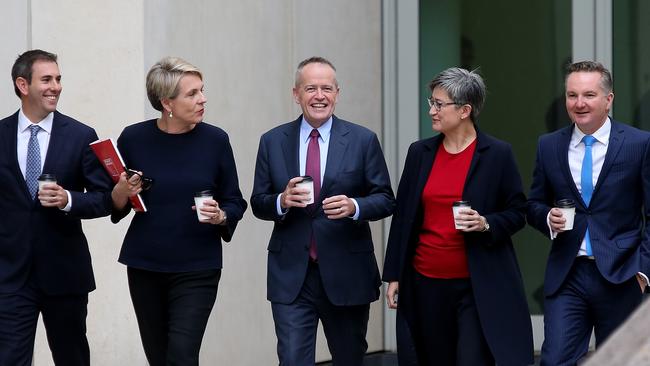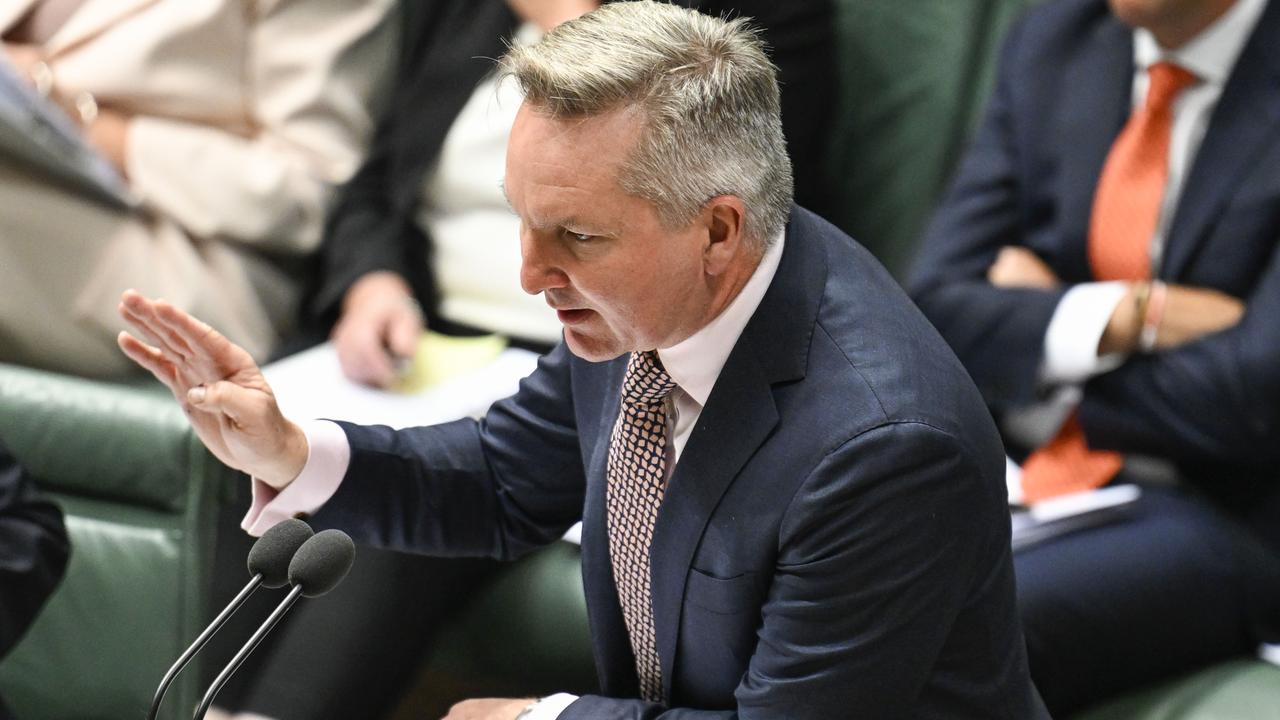
At 6.15 sharp every morning, Labor’s leadership group and senior campaign operatives dial in for a phone conference. They review the overnight tracking polling, discuss media coverage, confirm plans for the day ahead and settle on policy announcements and political messaging.
Those on the line include Labor’s leadership group of Bill Shorten, Tanya Plibersek, Penny Wong and Don Farrell, plus frontbenchers Chris Bowen and Brendan O’Connor, party president Wayne Swan, national secretary Noah Carroll, chief of staff Ryan Liddell, consultant Sharon McCrohan and campaign spokesman Jim Chalmers.
The calls are focused and disciplined, reflecting the unity and determination of Labor’s team over the past three years to win the election on Saturday. They work well together and any differences are amicably resolved. The stability within Labor’s leadership, and organisational and staffing ranks is a significant campaign strength.
It is a testament to Shorten’s ability to lead a team. He has united the parliamentary party, the organisational wing and the union movement solidly behind him. He even managed to get Kevin Rudd and Julia Gillard to set aside their blood feud and sit next to each other at Labor’s campaign launch.
Harry Truman once said that if you want a friend in politics you should get a dog. But Shorten told me that he regards Plibersek as a great friend, and she returned the compliment in a separate interview, saying the same about him. Bowen and Chalmers speak to each other every day, and also confirmed in interviews that they regard each other as friends. This is rare in politics.
Labor has outlined a bold policy agenda across government. Much of the campaign has been focused on Labor’s turf. Whether it’s health, education, climate change and energy, taxation, housing or workplace relations policy, more time has been spent debating the merits of Labor’s ideas than the Coalition’s ideas.
The release of Labor’s policy costings last week — earlier than any other opposition — by the independent Parliamentary Budget Office further shows how determined they are to make sure that they are upfront with voters. It is remarkable that Labor is offering a huge spending program while massively raising revenue but still keeping the budget in surplus and paying down debt.
Shorten, Plibersek and Bowen decided long ago that they wanted Labor to go to this election with a renewed policy platform that was very different to the Coalition. They also want to earn a mandate for their policies. They plan to press ahead and implement them, as promised, if they win government. Navigating these policies through the Senate, however, could be challenging.
Not only does Labor have a united, focused and disciplined team with fully costed policies, they have a clear vision for the future. Shorten’s principal campaign message has long been “A Fair Go For Australia”. It is more than just a slogan. It animates the broad purpose of Labor’s suite of policies across the board.
The contrast between the opposition and the government could not be greater. The Coalition’s campaign launch on Sunday was a low-energy event at which hundreds of seats were left vacant. There were no former Liberal prime ministers or opposition leaders present and many on the Coalition’s front bench were absent. It was emblematic of the Coalition’s campaign, which seems to be running near empty.
Labor’s tribalism was not replicated at the Coalition launch. There was no hoopla, as Scott Morrison promised. In a long speech, the Prime Minister talked of political values, policy achievements and election promises geared mostly to families. But Morrison’s key pitch to voters was personal and he characterised the election as a choice about prime ministers rather than parties.
Morrison and Josh Frydenberg are the Coalition’s best assets. The one-two punch team have applied the blowtorch to Labor’s policies. They have successfully elevated economic and budget management. Most of all, Morrison has a polling edge over Shorten as preferred PM, and he is deploying it.
But Morrison’s unremitting attacks on Shorten, and the Coalition’s broader negative campaigning, is a turn-off for some voters. It has not damaged Shorten, whose personal ratings have improved during the campaign. But it might be hurting Morrison and the Coalition. Preference deals with Clive Palmer’s United Australia Party and Pauline Hanson’s One Nation have also hurt the Coalition in their held seats.
Labor’s brand is its policy agenda, whereas the Liberal Party’s brand is focused on Morrison. The Coalition has still not outlined a detailed set of policies or a compelling vision for a third term. Several policies, such as climate change and energy, are no-go areas. They don’t have a detailed climate change policy. It should be no surprise Labor will make climate change its policy focus this week.
Labor is confident, but not complacent, that it will win. It doesn’t believe the contest is too close to call or that the next announcement from the Coalition will be some kind of game-changer that suddenly makes it competitive. They know that voters will not ignore years of policy chaos, political dysfunction and revolving-door prime ministers.
The national polling is instructive. The Coalition has not been able to close the gap with Labor during the campaign to draw even, let alone ahead. It remains behind at 49-51 per cent on a two-party basis. Moreover, there has not been a major national poll since the last election that has showed the Coalition ahead of Labor.
Labor’s marginal seat polling suggests it will reclaim government, but it won’t be a landslide. The Coalition has, at best, a slim chance of being re-elected. It takes a lot of marginal seat gymnastics to find a pathway to a Coalition victory. Labor is surging in Victoria, performing strongly in Western Australia and NSW, holding in South Australia and Tasmania, and is optimistic about Queensland.
Shorten, after a wobbly start, has campaigned well. His personal ratings have climbed and the gap with Morrison as preferred prime minster has narrowed. Shorten has always been underestimated. Now he is on the threshold of becoming Australia’s 31st prime minister. If Labor wins the election, much of it will be due to Shorten’s considerable talents in leading his team.



